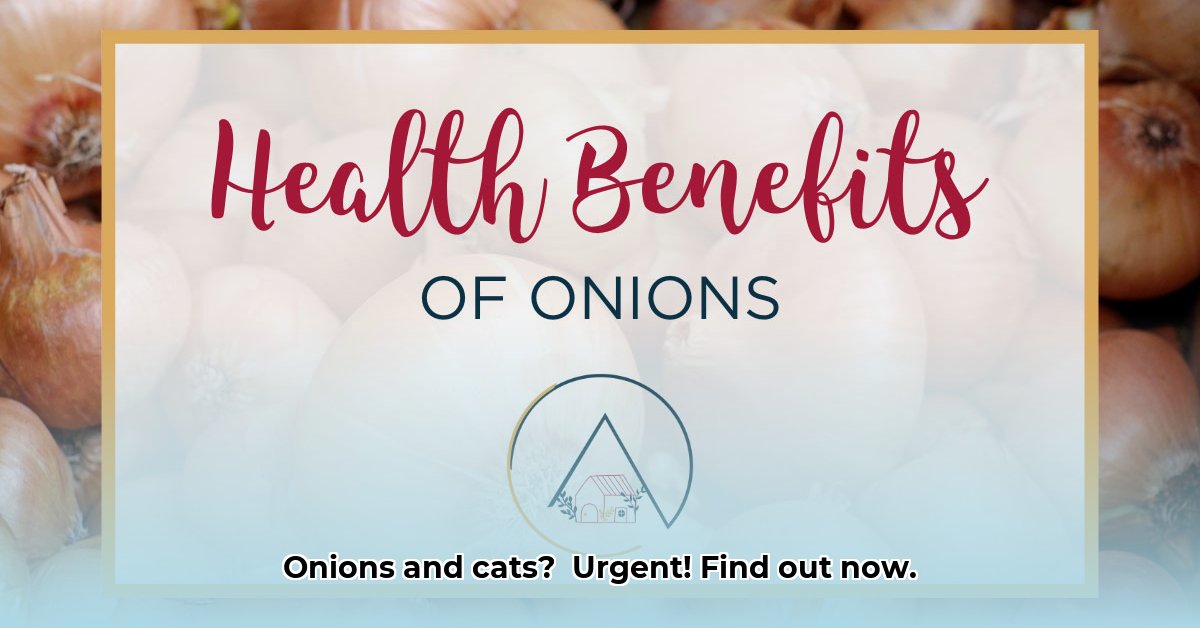
Understanding Onion Toxicity in Cats
Finding out your cat's had a sneaky nibble of an onion is scary, eish! But it's crucial to act fast. Onions, garlic, chives – the whole allium family – are seriously toxic to cats. They contain thiosulphates, chemicals that damage red blood cells, leading to hemolytic anaemia (a deficiency in red blood cells). This means their blood can’t carry enough oxygen, resulting in serious health problems.
Recognizing the Danger Signs: Is Your Cat Showing Symptoms?
Even a small amount of onion can cause problems. Keep a close eye on your cat for these warning signs:
- Upset tummy: Vomiting and diarrhoea are common early indicators. It's more than just a tummy rumble – we're talking the full shebang.
- Lethargy: Your usually playful cat might suddenly become sluggish and lose interest in their favourite things.
- Pale gums: This is a serious sign. Healthy gums are a nice pink; pale gums suggest anaemia. Check carefully!
- Excessive thirst: Increased thirst and urination often indicate your cat's body trying to compensate for the oxygen shortage.
- Difficulty breathing: Laboured breathing is a serious sign of low oxygen levels. This is a veterinary emergency.
- Weakness: If your cat seems unusually weak or wobbly, act immediately.
If you see any of these, don't delay!
What To Do: Your Action Plan for a Speedy Recovery
Time is of the essence! This isn't a drill; your cat's health depends on immediate action.
Call your vet immediately! Don't even hesitate. Explain everything clearly and calmly.
Gather vital information: Your vet needs details: How much onion did your cat eat? What type? When did it happen? Your cat's weight and breed? More information helps them assess the situation.
Provide supportive care (but no home remedies!): Keep your cat comfortable in a quiet spot, and ensure fresh water is readily available. Absolutely do not give any home remedies or milk – these can worsen the situation.
Follow your vet's advice precisely: Your vet will provide tailored instructions, possibly including intravenous fluids, medication, or blood transfusions depending on severity. They're the experts; trust their guidance.
Prevention: Keeping Onions Away From Your Cat
Preventing onion poisoning is far easier than dealing with the consequences.
- High storage: Keep all onions and other alliums (garlic, chives, leeks) well out of reach – high cupboards are ideal.
- Thorough cleaning: Immediately discard onion scraps and meticulously clean any surfaces where onions were prepared. Even tiny bits are dangerous.
- Check pet food labels: Onion powder is sometimes hidden in pet food. Always check the ingredients carefully.
- Safe spaces: Designate onion-free zones where your cat usually plays.
Long-Term Care and Veterinary Treatment
Your vet will monitor your cat's recovery with blood tests to assess the damage and guide treatment. Early intervention dramatically improves the chances of a full recovery. However, severe cases can sadly have a tragic outcome. That's why prompt action is vital.
Onion Risk Assessment Table
This table outlines potential scenarios. Remember, each cat is unique.
| Onion Exposure Level | Likelihood of Toxicity | Potential Consequences | Recommended Action |
|---|---|---|---|
| Tiny Amount | Low | Possibly mild gastrointestinal upset (vomiting/diarrhoea) | Observe carefully for 24 hours. Contact vet if symptoms worsen. |
| Moderate Amount | Moderate | More likely gastrointestinal issues and potentially anaemia. | Immediate veterinary consultation strongly advised. |
| Significant Amount | High | Serious anaemia; potentially life-threatening complications. | Emergency veterinary care needed; blood transfusion possible. |
Key Takeaways: Remember These Vital Points
- Onions are seriously toxic to cats. Even small amounts can cause serious problems.
- Onion poisoning can lead to life-threatening anaemia.
- Immediate veterinary attention is crucial. Don’t delay!
- Prevention is your best defence. Keep onions and other alliums out of your cat's reach.
Remember, your quick action can make a huge difference. Don’t hesitate – contact your vet immediately if you suspect your cat has ingested onions. Your furry friend’s life may depend on it!